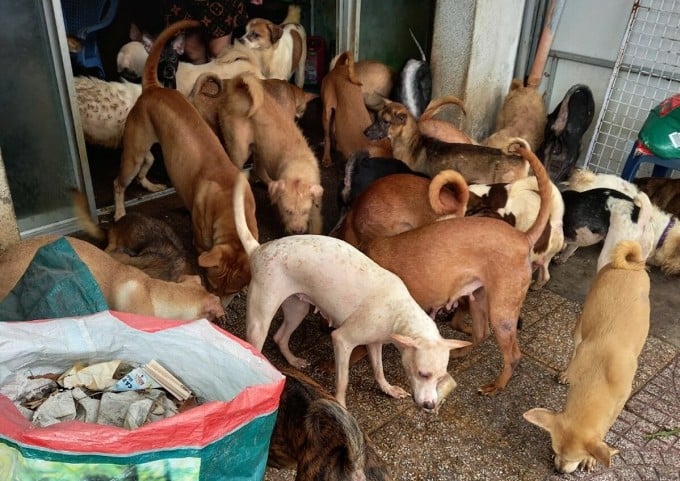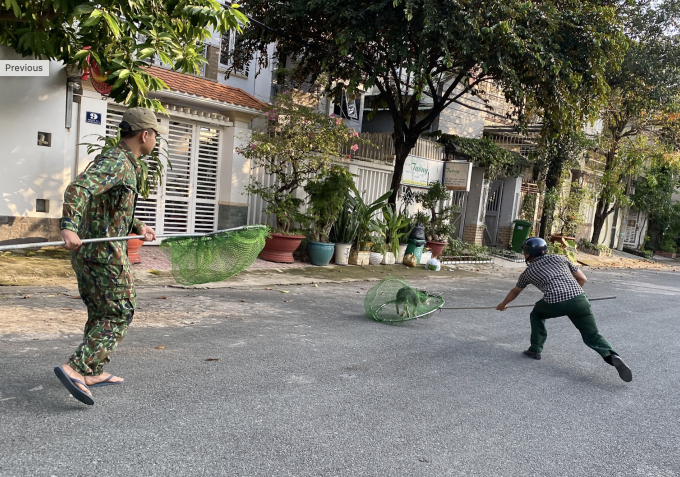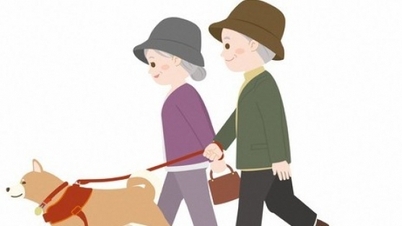Ho Chi Minh City : More than 50 households in District 4 have petitioned the government for help because they could not stand the noise and stench of nearly 100 dogs that a household had been raising illegally for many years.
"Even though the doors are tightly closed, the smell of pet waste still permeates the house, causing the family to endure it for a long time," said Nguyen Kha Ai, 50, who lives in a three-story house in Ward 9, District 4, in frustration when talking about the homeowner who keeps too many dogs next door.
Mr. Ai said that nearly ten years ago, the house next door only had a few dogs, then the owner took in new puppies and sick dogs. Now, the house is only 26 square meters wide but has nearly a hundred dogs. At noon or at night, when strangers pass by, they bark together, making a lot of noise, waking up his family. Many people come to the area to rent space to sell food but cannot maintain it because of the strong stench from dogs that have not been cleaned for a long time.
Neighbors had come to warn this householder but were met with resistance. By early 2021, more than 50 households in the neighborhood had filed a petition for help, but the authorities could not handle it completely. "I also love animals, but raising 1-2 dogs, not a pack of dogs that affects others is not okay," Mr. Ai said.

A pack of dogs surrounded the house of a resident with 82 dogs in District 4 during an inspection by authorities. Photo: Van Tuan
Ms. Vo Kim Anh Phuong, Chairman of Ward 9 People's Committee, said that the above household raised the dogs spontaneously without any notification, and the authorities only knew the information when many neighbors reported it. After many times inviting them to work, in March 2023, the ward fined this household 64 million VND for causing environmental pollution. However, the authorities later had to withdraw the decision because the law was not strict, even though they hired a company to take samples of the dogs' waste for testing.
Regarding the issue of the number of pets, Ms. Phuong said that until now there have been no regulations so the locality cannot force the owner to reduce them. "When the interdisciplinary team came down to inspect, they recorded the bad smell and noise emitted into the environment but could not handle it because of the lack of legal basis," Ms. Phuong said, adding that up to now, despite applying many methods, the locality has not been able to fine the owner even though the neighbors have continuously complained.
The suffering that many households in Ward 9 endure is also the common situation of many people in Ho Chi Minh City when living next to neighbors who keep many dogs and cats. According to statistics, the city currently has nearly 106,000 households with about 184,000 dogs and cats, of which more than 65% of pets are in inner-city districts with small, limited areas.
A representative of the city’s Department of Agriculture and Rural Development said that there are no regulations, so most of the breeders do it spontaneously without notifying the local authorities. Some households raise dozens of animals spontaneously in the form of animal sponsorship to ask for funding, affecting many people around.
Mr. Le Dang Thang, Vice Chairman of Dong Hung Thuan Ward (District 12), said that in the area, there is a household raising more than 20 dogs, causing noise and odor. Neighbors have repeatedly reminded this household to reduce the herd and maintain hygiene, but it has not been effective and has led to arguments. The authorities have inspected many times but the situation has not improved.
According to Mr. Thang, even though there is a noise measuring device, when the authorities arrive, the homeowner has a way to control the dog to stop barking. While dealing with odors, according to the regulations of the Department of Natural Resources and Environment, it is not necessary to use measuring tools, but only need to do it intuitively by "using the nose to smell".
"The inspection team smelled a strong odor but could not impose a fine because the homeowner thought it was a subjective and unfounded opinion," said Mr. Thang. In addition, there are currently no regulations controlling how many dogs a household can keep, as long as they are fully vaccinated. Therefore, instead of imposing fines, the locality has repeatedly tried to reconcile the dog owner and neighbors to avoid conflicts.

The People's Committee of Hiep Binh Chanh Ward established a team to catch stray dogs in the area in 2023. Photo: Dinh Van
To limit the situation of dogs and cats causing noise, unsanitary public places, attacking people, and spreading diseases, the city's Department of Agriculture and Rural Development is developing temporary regulations to manage pets in urban areas. This is to clearly manage and sanction pet owners who do not comply with existing regulations, affecting people and the environment.
The criteria will be appropriate to the number of livestock per household, attaching responsibility to the owner, when raising livestock, must declare to the authorities so that the functional sector can monitor the total herd and prevent and control epidemics. According to the Department of Agriculture and Rural Development of Ho Chi Minh City, the proposal is supported by many communes, wards as well as people because it will help punish violating livestock owners.
Vice Chairman of Dong Hung Thuan Ward Le Dang Thang proposed that there should be regulations on how many animals a household can keep on a certain area. He gave the example that a family living in an apartment or townhouse can only keep a maximum of 5 animals. If it is a small apartment or in a crowded residential area or a boarding house, the number may be less.
"Limiting the number of pets will help reduce noise and odors in residential areas," said Mr. Thang.
Mr. Nguyen Huu Thiet, Deputy Head of the Animal Husbandry and Veterinary Department of Ho Chi Minh City (the unit that advised on the proposal), said that the regulations on registering dogs and cats that are being consulted state that it is necessary to limit the number of pets in residential areas to limit odors and noise.
Dinh Van
Source link



![[Photo] Binh Trieu 1 Bridge has been completed, raised by 1.1m, and will open to traffic at the end of November.](https://vphoto.vietnam.vn/thumb/1200x675/vietnam/resource/IMAGE/2025/10/2/a6549e2a3b5848a1ba76a1ded6141fae)






































































































Comment (0)